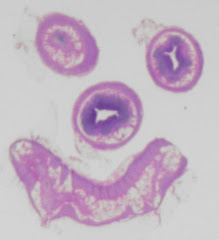I've learned recently that university PA programs are graduating Masters-level Morgue Attendants (MA) (ie. when it comes to autopsy pathology). Although the graduates are supremely competent in all things 'Morgue Attendant', they have no idea of what it is -- to my way of thinking -- to be a Pathologists' Assistant to the fullest extent of the meaning of the title.
To clarify... the MSc PA graduates are at a point where they are very prepared for a career in surgical pathology. I'm fine with that but I'm talking about autopsy here.
My vision of a PA's responsibilities at [a medical] autopsy: a PA confirms that a proper consent is in place; does the first draft of the clinical history; reviews the history with the supervising the pathologist and formulates a plan for the autopsy; performs the external examination with the assistance of a Morgue Attendant; eviscerates with the assistance of a Morgue Attendant; dissects, weighs, measures, etc. all of the organs and -- this is the MOST IMPORTANT part -- examines the organs while performing the dissection and interprets all findings, whether normal or abnormal; records all findings; makes judgements while being mindful of the patient's history (and examines the organs for expected findings and, as importantly, for unexpected findings); examines the external brain (removed by the MA); reviews the gross findings with the supervising pathologist after the case; prepares the initial draft of the preliminary report; dictates the gross autopsy report; performs detailed dissection and sampling of heart and brain, as necessary; blocks all routine tissues as well as heart and brain and dictates findings for all routine tissues as well as for both heart and brain, as is appropriate for the case; presents the case history and gross findings at autopsy rounds; blocks all tissues including heart and brain and dictates specific portions of the report related to heart and brain; and lastly, compiles all reports and slides and delivers all to the pathologist in timely fashion.
It is not the MSc PA grads who are to blame (obviously); it is the program. The program is run primarily (from a curriculum standpoint) by the pathologist(s) at the site(s). The problem, or so it seems, is that pathologists want PAs to be MAs, not true assistants. I'd love to see the programs train the PAs to apply the medical and pathological knowledge which they have presumably been taught so that they can competently handle surgical pathology specimens, to autopsy. In fact, PAs should gain the knowledge gleaned from autopsy BEFORE performing gross descriptions of surgical specimens. This is the traditional method for training of pathology Residents and it ought to apply to PAs also, for exactly the same reasons.
PAs exist. Use them. Don't hold back; train them to their fullest capabilities.
Wednesday, December 12, 2012
Subscribe to:
Post Comments (Atom)



I liked it very much.
ReplyDeleteThank you
I hope you will keep updating.
ReplyDeleteI am entering my first year of a Kinesiology program in September and hoping to become a Pathologist Assistant in the future. I found your blog to be really helpful into giving me insights about the career.
I hope you're ready to welcome an American into the Canadian Pathologist's Assistant field! Yes, my good friend....I am a U.S. citizen with an undergraduate Pathologist's Assistant degree that was not NAACLS-accredited, who will be applying to a Canadian P.A. program shortly. Hopefully, Canada will treat me far better than the USA has over the past decade. Having NAACLS accreditation is vital to any Master's level P.A. program, since so many jobs require that these days. I look forward to potentially working alongside of you for the health and betterment of the Canadian citizens.
ReplyDelete